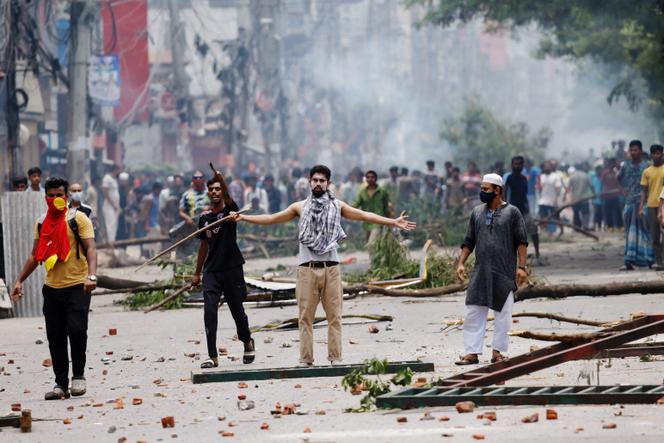


News from Bangladesh comes in dribs and drabs, bearing witness to unprecedented violence. Internet and cell phone services have been disrupted since the evening of Thursday, July 18. Most local newspaper websites remain inaccessible.
Student protests against quotas in the civil service, until then relatively peaceful, turned on July 15 into widespread violent clashes with the authorities. The clashes have pitted students against law enforcement and counter-demonstrators from the Bangladesh Chhatra League (BCL), the student wing of Prime Minister Sheikh Hasina's Awami League, for several days.
The death toll remains uncertain. At least 110 people have died so far this week, 62 on Friday alone. Thousands have also been injured. "The rising death toll is a shocking indictment of the absolute intolerance shown by the Bangladeshi authorities to protest and dissent," said Babu Ram Pant, deputy regional director for South Asia at Amnesty International. The UN High Commissioner for Human Rights also condemned the crackdown, calling the attacks "particularly shocking and unacceptable."
The closed-door atmosphere now imposed by the government, which has deployed the army and imposed a curfew, raises fears of the worst human rights violations. On the morning of July 20, the streets of Dhaka remained deserted, but military and paramilitary forces had taken up positions in various parts of the capital.
On Friday, demonstrators defied a ban on gatherings in Dhaka. On the 19th day of the mobilization that began on July 1, the city was the scene of chaos: clashes, chases, but also arson, notably targeting government buildings. In the Narsingdi district, 50 kilometers from Dhaka, demonstrators stormed a prison, freeing dozens of inmates. Hundreds of wounded were pouring into hospitals. According to the deputy director general of Dhaka's Farazy Hospital, many demonstrators took refuge on July 19 in the narrow alleys around the hospital, where helicopters were firing at them from the air. At Uttara Hospital in the capital, one person was shot at point-blank range.
The anti-quota movement has reached an unprecedented scale. Students took to the streets to protest against a positive discrimination system that reserves 30% of civil service jobs for descendants of those who fought for the country's independence in 1971, alongside Hasina's father, Sheikh Mujibur Rahman. The students feel that this gives an advantage to the prime minister's supporters and are calling for merit-based recruitment. These regulations were already reviewed in 2018 under pressure from student protests. But in June, a court ordered the government to reinstate the quota of public jobs reserved for relatives of war veterans. The Supreme Court, which has temporarily suspended the quota system, will consider the issue on July 21.
You have 49.71% of this article left to read. The rest is for subscribers only.
